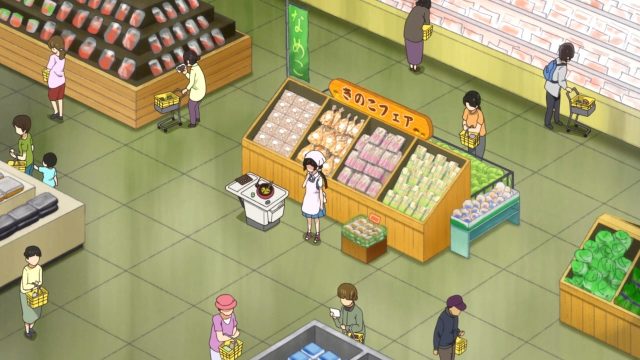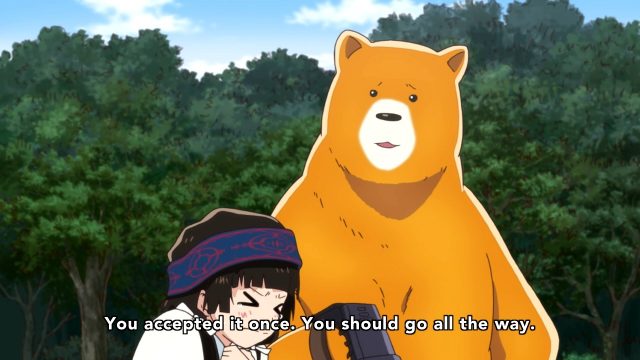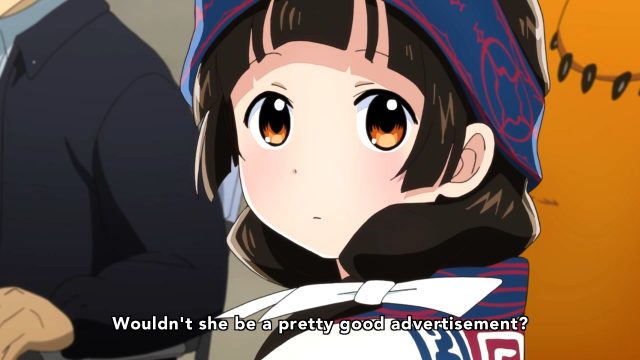Zutto happy days, my ass.
Setting the Stage
Machi is a shrine maiden in a remote, rural village who aspires to one day experience the city life she’s always dreamed of. She’s also friends with a bear or something.
Yet what starts out as a cute look at an earnest girl’s ignorant attempts to become more like them thar city folk turns into a tone-deaf, saccharine chronicling of child abuse.
Hit Me Harder
At first, all the Machi Abuse comes across as standard slapstick. Whenever Machi encounters a setback, she resolutely rebounds, curating empathy with the viewer as she demonstrates a strong sense of character. Simple, cheap, effective.
But the show takes this basic character building and makes each setback crueler and crueler. Until eventually, Machi stops rebounding.
Give and Take and Take and Take
After watching the show a bit, you’ll find it settles into a clear pattern: Whenever anything good happens to Machi,
the injustice of decency is immediately corrected.
Over time, the pattern frays until the show finally dispenses with formalities and just throws Machi into situations where she pointlessly suffers.
Good thing nobody watching the show can relate to social anxiety or this scene would be quite uncomfortable.
Machi gets unfairly shit on by the few people she knows in the world, we get a reaction face, time passes, and then the cycle repeats until the end of the episode. Repeat 12 times or until otherwise finished.

Manipulated and bullied into submission in every episode, Machi is pathetically and utterly robbed of her agency.
Now if Kuma Miko was at least somewhat cognizant of what it was presenting, that’d be one thing. But its complete lack of self-awareness frustratingly drags the show into depths normally reserved for hacks the like of Gen Urobuchi or Mari Okada.
It’s Just Bad Writing
Not everything needs to make a point or have a moral or result in some pathetic “everyone wins” fairy tale bullshit. But at the same time, I expect there to be reasoning behind prominent character interactions. As far as I can tell here, there isn’t any. I won’t say it’s problematic, but it sure as fuck is a problem.
Machi’s suffering has a non-effect on her development — she neither grows nor regresses. She doesn’t learn, or react in any fashion that shows her as a character comprised of more than just lines on a screen. Her pain doesn’t forward the plot in an appreciable way, nor does it provide the comedic lining one would normally expect.
There is no sensible literary excuse for this — it is pointless, ineffective writing. And Kuma Miko suffers for it almost as much as Machi does.
An Ending as Satisfying as a Handjob from Captain Hook
At its finality, Machi decides to stay in her village for the rest of her life because she believes (and is led to believe) she will never be accepted in the city.

Ironic, considering the only people to refuse to accept her as even so much a human being are her fellow villagers.
Everyone cries, as hugs are had and Machi’s entire character arc is erased in 20 seconds. Cue credits, please remember to buy the blu-rays
Verdict
Machi’s a good girl, and that keeps the show worth watching even through its etch-a-sketch finale. But when the entire supporting cast is trash, the resulting odor becomes hard to ignore.
Damn shame, because Kuma Miko would have been perfect had it simply protected Machi’s smile.
![[HorribleSubs] Kuma Miko - 10 [720p].mkv_snapshot_06.24_[2016.06.26_15.27.33]](http://www.crymore.net/wp-content/uploads/2016/06/HorribleSubs-Kuma-Miko-10-720p.mkv_snapshot_06.24_2016.06.26_15.27.33-640x360.jpg)




![[HorribleSubs] Kuma Miko - 05 [720p].mkv_snapshot_04.22_[2016.06.25_11.04.35]](http://www.crymore.net/wp-content/uploads/2016/06/HorribleSubs-Kuma-Miko-05-720p.mkv_snapshot_04.22_2016.06.25_11.04.35-640x360.jpg)




